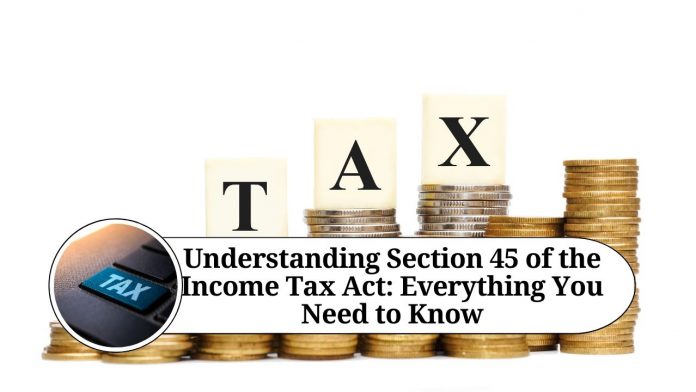The Income Tax Act is an essential piece of legislation that governs the taxation of income in India. It provides the legal framework for the collection, administration, and enforcement of income tax laws in the country. Section 45 of the Income Tax Act is an important provision that deals with the taxation of capital gains. In this blog post, we will discuss the provisions of Section 45 of the Income Tax Act in detail.
What is Capital Gains Tax?
Before delving into the provisions of Section 45 of the Income Tax Act, it is essential to understand what capital gains tax is. Capital gains tax is a tax on the profit made from the sale of a capital asset. A capital asset is any property that an individual owns, such as real estate, stocks, and bonds. When a capital asset is sold, the difference between the selling price and the purchase price is considered a capital gain. This gain is taxed as per the provisions of the Income Tax Act.
Provisions of Section 45 of the Income Tax Act
Section 45 of the Income Tax Act deals with the taxation of capital gains. According to this section, any profit or gain arising from the transfer of a capital asset is taxable under the head ‘capital gains.’ The term ‘transfer’ includes the sale, exchange, or relinquishment of a capital asset, as well as the extinguishment of any rights therein. The section also covers the compulsory acquisition of a capital asset by the government.
Calculation of Capital Gains
Section 48 of the Income Tax Act provides the method for calculating capital gains. The capital gains are calculated by subtracting the cost of acquisition of the capital asset from the net sale consideration. The cost of acquisition includes the actual cost of the asset, as well as any expenses incurred in acquiring it, such as brokerage fees, legal fees, and stamp duty. The net sale consideration is the sale price minus any expenses incurred in selling the asset, such as brokerage fees and legal fees.
Capital Gains Tax Rates
The Income Tax Act provides different tax rates for long-term and short-term capital gains. If a capital asset is held for more than 36 months, it is considered a long-term capital asset. Long-term capital gains are taxed at a lower rate than short-term capital gains. For the financial year 2022-23, long-term capital gains are taxed at 20%, while short-term capital gains are taxed at the regular income tax rate.
Exemptions from Capital Gains Tax
The Income Tax Act provides various exemptions from capital gains tax. One such exemption is provided under Section 54 of the Act, which allows individuals to claim an exemption from long-term capital gains tax if they use the sale proceeds to purchase a residential property. The exemption is available if the new property is purchased within two years of the sale of the original property, or if the individual constructs a new property within three years of the sale. The exemption is limited to the amount invested in the new property.
Conclusion
Section 45 of the Income Tax Act is an essential provision that governs the taxation of capital gains in India. It is important for individuals to understand the provisions of this section and comply with the income tax laws. Failure to comply with the provisions of the Act can result in penalties and legal consequences. It is advisable to consult a tax professional for guidance on tax planning and compliance.
Read more useful content:
- section 234e of income tax act
- section 286 of income tax act
- section 90a of income tax act
- section 40a(7) of income tax act
- section 226(3) of income tax act
- section 24 of income tax act
Here are some frequently asked questions about Section 45 of the Income Tax Act:
What is Section 45 of the Income Tax Act?
Section 45 of the Income Tax Act deals with the taxation of capital gains. It provides the legal framework for the collection, administration, and enforcement of capital gains tax in India.
What is capital gains tax?
Capital gains tax is a tax on the profit made from the sale of a capital asset. When a capital asset is sold, the difference between the selling price and the purchase price is considered a capital gain, and this gain is taxed as per the provisions of the Income Tax Act.
What is a capital asset?
According to Section 2(14) of the Income Tax Act, a capital asset is any property owned by an individual, including real estate, stocks, bonds, and other investments.
How is capital gains calculated?
Capital gains are calculated by subtracting the cost of acquisition of the capital asset from the net sale consideration. The cost of acquisition includes the actual cost of the asset, as well as any expenses incurred in acquiring it. The net sale consideration is the sale price minus any expenses incurred in selling the asset.
What is the tax rate for capital gains?
The Income Tax Act provides different tax rates for long-term and short-term capital gains. For the financial year 2022-23, long-term capital gains are taxed at 20%, while short-term capital gains are taxed at the regular income tax rate.
Are there any exemptions from capital gains tax?
Yes, the Income Tax Act provides various exemptions from capital gains tax, such as the exemption provided under Section 54 of the Act, which allows individuals to claim an exemption from long-term capital gains tax if they use the sale proceeds to purchase a residential property.
What happens if I don’t comply with the provisions of Section 45?
Failure to comply with the provisions of the Income Tax Act can result in penalties and legal consequences. It is advisable to consult a tax professional for guidance on tax planning and compliance.




















